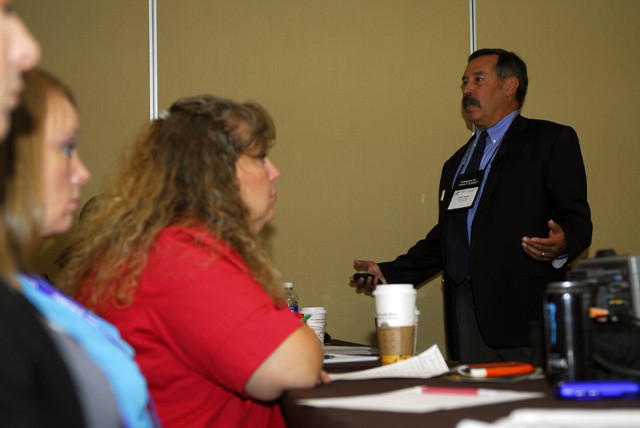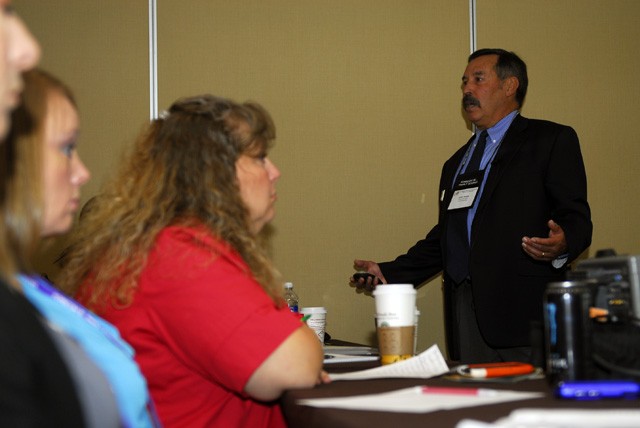
CRYSTAL CITY, Va. (Oct. 23, 2010) - Teaching gathered Family Readiness Group leaders how to counter the stress they and their Soldiers have faced during more than nine years of war was the focus of the "Reintegration and Mitigating Impacts of Recurring, Frequent and Extended Deployments" breakout session held here Oct. 23.
Part of the third annual U.S. Army Forces Command Family Readiness Group Training Symposium, the session was one of five available to FRG leaders here during day three of the training event.
FORSCOM Well-Being Specialists Felix Major and Terrance Spoon led the breakout session, teaching the 470 FRG leaders who represented FORSCOM units from installations nationwide.
Before launching into their presentation, Major and Spoon said they wanted to get a feel for how many of the FRG leaders' Soldiers have been deployed once or more. Spoon asked for a show of hands from those who's Soldier had been through at least one deployment. All the hands went up. He then continued the process until he had called for the hands of those who's Soldier had deployed six times, which resulted in only a few hands. Bottom line, it was clear to Major and Spoon that this group of Army spouses, volunteer FRG leaders all, had certainly encountered the stress of deployments.
Spoon then explained the risks of the stress associated with deployments and the internal and external causes of stress. He said internal stress can be due to the inability to accept uncertainty, to pessimism or to unrealistic expectations. External stress can result from major life changes, such as relationship difficulties or financial difficulties.
"The average 21 to 22 aged Soldier who is deployed experiences stress equivalent to that of a 34 to 35 year old man," said Spoon.
Pre-deployment is most stressful for the Soldiers. However, re-deployment is the most stressful for the spouses, said Spoon. Unfortunately, stress can also be a major factor in suicide, a problem that has increased in recent years across the Army.
"When we look at suicides, the number one factor is that in about 63 percent of suicides, relationship issues are involved," said Spoon.
Spoon then explained that younger enlisted Soldiers often lack an understanding of life skills such as how to communicate information about a deployment with their spouse. One issue both Soldiers and spouses typically have is management of their expectations.
For spouses who have trouble with deployment, there is a Resilient Spouse Academy held at Fort Riley, Kansas. It's a four-day resiliency training program that helps spouses learn coping skills to handle the effects of deployment.
This program is a 40-hour class that includes:
Aca,!Ac Suicide prevention and intervention training,
Aca,!Ac Army Master Resilience Training,
Aca,!Ac Recognizing and responding to domestic violence, sexual assault, substance abuse, and providing survivor support,
Aca,!Ac Preventing and responding to financial crisis.
Wrapping up the presentation, Spoon and Major stressed the importance of communication, especially during reintegration. When a Soldier first returns, it's often hard for the Soldier, the spouse and the children to adjust to the changes in the household structure and relationships that are certain to occur during a deployment. Communication is a critical tool to help lessen the impact of recurring, frequent and extended deployments.
They also emphasized that Families must be aware of all the resources available to them from the Army. There are many. For more information about the programs and services available to help mitigate stress, visit the Military OneSource website (www.militaryonesource.com) or your local Army Community Service office.

Social Sharing